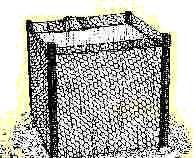Categories
Calendars
Guides
Reviews
Archive
Gallery
Articles
Ask Our Gardening Expert
COMPOSTING MADE SIMPLE
Garden Compost These pages describe how to make great garden compost.
When compost is added to the soil it improves the texture.
The result is that clayey soil become crumbly and retains the correct
amount of water without water-logging; sandy soil retains moisture and
therefore nutrients - it doesn't matter what soil type you have, make
compost to improve it.
Compost is free! Addition of compost to the soil reduces
or removes the need for expensive and dubious chemical additives. When compost is added to your soil, this encourages
earthworms and other beneficial organisms. These break down the soil
causing nutrients to be released LET AIR CIRCULATE INSIDE THE COMPOST BIN OR HEAP The key to making a good compost bin or heap is to use a
mixture of finer materials (grass clippings, leaves etc.) and coarser
materials (shrub clippings, straw etc.). This mixture prevents the heap
from compacting which prevents sufficient air circulation. Regular turning of the compost bin (once or twice a
month). This involves taking a fork to the heap and mixing up the
contents. This introduces air into the compost which speeds up the
composting process. SUFFICIENT MOISTURE The micro-organisms in the compost bin and heap need
moisture in order to do their work of breaking up the contents of the
compost heap. Normally, the finer materials in the compost heap provide
enough moisture, but if a lot of coarser materials are used, it may be
necessary to apply a small amount of water infrequently. Straw, in
particular can cause a compost heap to become too dry, so water the
straw before adding it to the heap. Don't let the heap become
water-logged though, this is worse than too little water. Not surprisingly, the micro-organisms in the compost
need food if they are to rot down the heap and turn it into compost.
These ingredients are called compost activators. Green compost (grass
cuttings, leaves etc.) provide a good amount of food, although the
addition of bone meal, animal manure, or similar will speed the process
composting process considerably. HEAT Garden waste will only turn to compost if there is
sufficient heat. Within limits, the higher the temperature of the
compost heap, the quicker it will become usable. The peak temperature of
a compost heap is 60C (140F), at this temperature, it will compost
quickly and destroy weed seeds. You can help the heap to achieve this temperature first
by making it a decent size - the larger the compost heap, the higher
will be its temperature. A meter (3 feet) square, by a meter high is
ideal. Where the heap contains adequate water, cover it over the top
with a plastic sheet for a week or so.
The word 'compost' describes two different substances -
garden compost which is used to condition and feed the soil; potting
compost which is used as a medium for propagating and growing seeds and
plants.
COMPOSTING - THE BENEFITS OF COMPOST
The simplest compost bin container - 4 sticks of wood in
the ground,
Wire or plastic netting round the sticks, lined with cardboard.
Quick, cheap but very effective.COMPOSTING - THE INGREDIENTS
COMPOSTING - MICRO-ORGANISMS AND HEAT